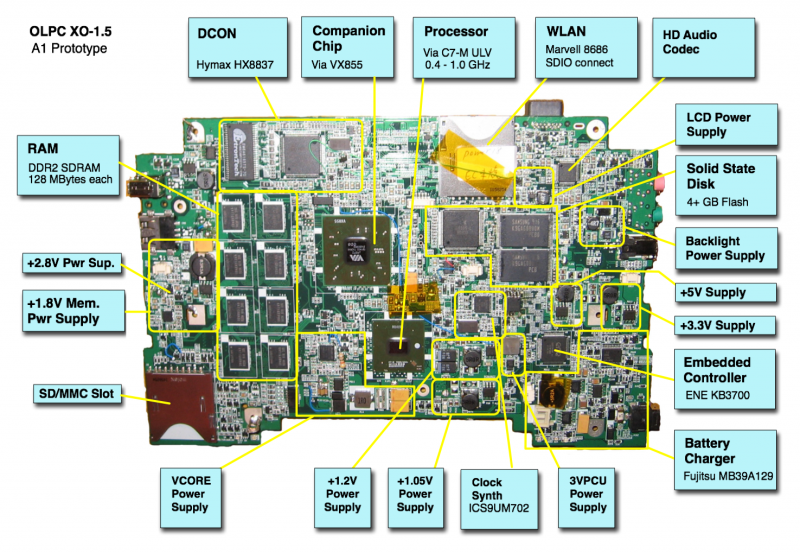XO 1.5 A2
XO-1.5 Laptop Alpha test model second A-Test, also known as A2.
Description
The A2 prototype motherboard is a revised version of the A1 motherboard, fixing many of the small problems encountered with the layout. OLPC should receive thirty of these around the second week of July, 2009. All are dedicated to development and testing, with about half going to hardware/firmware and half to Linux.
Supporting documentation for these boards are (in PDF):
These are the same as for A1 boards.
Please note that production boards will likely have different pin mappings and connector locations.
Identification
- Bare circuit board, no case or display
Photographs:
Software Support
XO-1.5 use Q3axx firmware releases.
Restrictions
Heat
If you have a laptop in a case, please don't operate it for long periods of time with the back cover of the laptop in place. While a cover is provided for shipping, it is not screwed down and may be removed by simply removing the two green bumpers at the bottom sides of the display unit. Each is held in place by a single screw.
If you have a heat spreader (doubtful), this rule may be violated. A heat spreader (a thin aluminum plate) distributes the heat to avoid overheating the major sources of heat.
WLAN
A Marvell 8686 SDIO module is populated on the motherboard.
USB
As drivers in OFW and Linux do not properly control the USB power switch yet Trac #9366, most A1 boards have R155 shorted. This component is located on the top of the board, opposite the switch U5.
NAND Flash
All boards are populated with a Phison PS3006 NAND Flash controller and two NAND Flash chips for testing, providing 4 GBytes. There is also an IDE connector populated on the "top" of the board (side with LCD connectors). The inclusion of this chip does not imply it will be present in the final XO-1.5
Power-On Issues
A few A2 boards don't power-on reliably. On some boards, and more frequently after the chipset has warmed up, the short flash of red on the battery light indicates that the chipset never issued a PCIRESET when powered on. A solution is fixing the +1.2V power sequencing. The +1.2VSUS supply also needs sequencing for reliable power-on.
